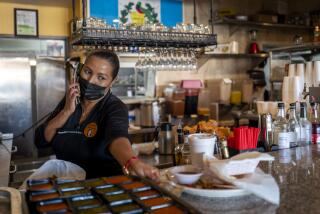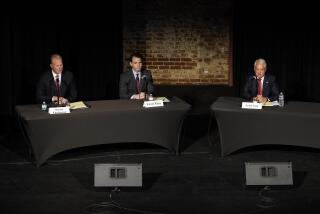Californians are wary of reopening too quickly amid coronavirus crisis, new poll says

- Share via
SACRAMENTO — A new poll finds that most Californians surveyed support the current statewide restrictions to stem the spread of the coronavirus, or want tougher safeguards, and remain fearful about contracting COVID-19 and landing in the hospital.
The Public Policy Institute of California poll released Wednesday night also found that 69% of likely voters in the state approved of Gov. Gavin Newsom’s handling of the coronavirus crisis, and 65% gave him high marks for the overall job he’s doing as governor.
The survey shows in stark terms how the pandemic delivered a devastating blow to the financial well-being of Californians, particularly blacks and Latinos, and those at the lower end of the wage scale. More than a third of Californians said they or someone in their household lost a job due to the coronavirus outbreak and half said they or a household member either saw their pay cut or had work hours reduced.
The fear of COVID-19 remains paramount to Californians. Of those polled, 36% said it is the most important issue facing California today, compared to 23% who believe jobs and the economy are the top concerns.
“They were concerned about their own well-being and they wanted to see restrictions put in place for their public safety. They are comfortable with maintaining those restrictions rather than loosening them,” said Mark Baldassare, the institute’s president and chief executive. “The anxiety is substantial.”
The PPIC poll, which was conducted between May 17 and May 26, found that 58% of California adults were worried about contracting the virus and having to be hospitalized. More than 70% of those polled said they support keeping current restrictions in place or increasing them, compared to the 28% who wanted fewer restrictions in place.
The survey found stark racial and income disparities in how the pandemic has affected Californians economically. Almost half of the Latinos surveyed said they or someone in their household lost their jobs due to the coronavirus, with 35% of African Americans and 34% of Asian Americans suffering the same loss. Twenty-four percent of white survey participants said they or a household member lost their jobs.
Among Californians earning less than $40,000 year, 47% reported losing a job among household members, compared to 22% of those earning more than $80,000.
Newsom in mid-March enacted the nation’s first statewide stay-at-home order in an effort to slow the spread of the virus, shutting down nonessential workplaces as most school districts in California closed classroom doors.
In May, those restrictions began to be eased county-by-county after state public health officials reported that the spread of the virus had stabilized, allowing a substantial increase in COVID-19 testing, stockpiled ventilators and protective gear for healthcare workers and ensuring the state’s hospital system could accommodate a potential surge in patients affected by the virus.
The survey found that 69% of California adults supported the way Newsom has handled the coronavirus pandemic, compared to 25% who disapproved. Newsom received high marks from Democrats and independents, as well as from a third of Republicans who were surveyed (55% of Republicans gave his response a thumbs-down).
“He took action, first and foremost,” Baldassare said. “What the governor is doing has given people hope.”
Baldassare said Newsom‘s actions also helped increase his overall job approval rating as governor which, at 64% among likely voters, is 13% higher than it was in February. By comparison, only a third of California likely voters approved of the job being done by President Trump.
Newsom’s efforts to deescalate his conflict with Trump, a feud waged throughout the governor’s first year in office, was likely a contributing factor to his increased support, Baldassare said, noting that the governor’s measured approach sent the message that a widespread crisis affecting millions was no time for partisan bickering.
Still, Newsom’s rosy approval numbers could take a substantial hit as the state contends with a dire budget deficit, and as the need for substantial spending cuts trickles down to local governments and school districts, he said. The consequences of the state’s financial woes, however, might not be felt until the late summer or early fall.
Newsom said last week that Californians have successfully slowed the spread of the coronavirus this spring, allowing the rapid easing of his stay-at-home order and freeing most residents to leave the safety of their homes to venture to salons, shops and restaurants, and in some cases return to work.
All but six of California’s 58 counties have been allowed to loosen their coronavirus restrictions. Counties granted waivers by the state have been allowed to reopen restaurants for in-person dining, along with barbershops and hair salons, with safeguards in place, such as the use of face coverings, a restricted number of customers and sanitation protocols.
The state had already allowed retailers to open, along with office buildings, manufacturers and other business, with the same safeguards in place. Faith-based organizations also can resume services, with the number of congregants limited.
Large gatherings, such as concerts and major sports events with fans, remain prohibited and are not expected to resume until there is a vaccine or effective treatment for COVID-19.
More to Read
Sign up for Essential California
The most important California stories and recommendations in your inbox every morning.
You may occasionally receive promotional content from the Los Angeles Times.











